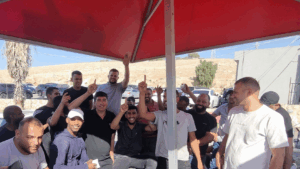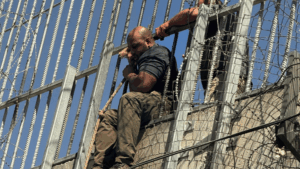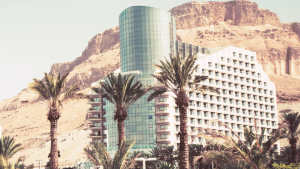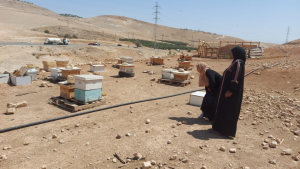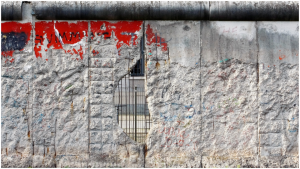Agricultural workers unable to work due to the wintry weather are ineligible for compensation. The government talks a lot on the need to help Arab women get into the labour market, nevertheless it hasn’t found it necessary to discuss the fate of the forcibly unemployed women workers, who have lost the sole income source for their families.
The recent stormy weather – specifically, the mid-January frost – have caused severe damage to Israeli agriculture. Assessed at 600 million shekels, the damage has left thousands of farmers in a state of crisis. Most have taken out natural disasters insurance, that insures compensation for their investments, and damage surveyors are now visiting agricultural areas to examine the extent of the damage. The farmers will absorb indirect damage and lost future profits and reputation, but will survive the damage once compensated.
Those not entitled to any compensation, and who have not been visited by anyone, are the agricultural workers, whose shoulders bear the weight of production in this vital sector. Thousands are being forced to remain idle due to the frost damage. Among those who lost their place of work are many groups of workers who are Arab citizens of Israel. In recent years, many hundreds of Arab women have found a job providing social benefits, in an employment arrangement that the WAC reached with dozens of farmers in the Sharon and Galilee regions. That important achievement is now placed in doubt.
Many male and female workers are confronting a distressing situation. Their employers want to continue the relationship with them and bring them back to work as soon as possible, so they refrain from firing them. This means that the workers are unable to seek unemployment benefits from the National Insurance. Equally interested in retaining their jobs, they are forced to wait at home with no source of income until the situation improves.
Alongside thousands of Arab farming workers are close to 30,000 Thai workers. Competition between the two groups is unfair. Israeli workers cannot compete with the Thais – who are available and disadvantaged. Even today, at this time of crisis, the farmers prefer to employ Thai workers who are anyway in Israel and cannot be sent back to their homes overseas. Whatever the situation, it’s the Arab workers who are first to be thrown out of the system: now it’s a natural disaster, but time after time price fluctuations in the global market, or another technical difficulty, have resulted in their being fired. In terms of Israeli agriculture, they act as a sort of “spare tire” to be used or removed when necessary.
People in favor of employing foreign workers argue that this is the accepted situation throughout the Western world. But in many European countries permission to import foreign laborers is contingent on a shortfall of local workers and it has to be coordinated with the trade unions. The overseas workers get exactly the same conditions as local ones, so there’s no economic incentive to prefer employing foreigners instead of locals.
In Israel, Arab workers are not considered a significant factor in the farming sector. The Minister of Agriculture looks out solely for the farmers and their profits, while the Histadrut fails to take up the farm workers’ cause. The government claims to be sensitive to poverty, announcing at every opportunity programs to increase employment rates of Arab women. Nevertheless it hasn’t found it necessary to discuss the fate of the forcibly unemployed women workers, who have lost the sole income source for their families.
The situation’s gravity is reflected not only in the enforced idleness of thousands of workers who receive no salary, but also in the halted process of hiring new Israeli workers in this sector. In this state of affairs, it would be reasonable for the government to consider compensating workers in a manner insuring a continued relationship with their employers. What should be applied here is the mechanism used to compensate hotel workers in 2000, when the intifada began. To insure continued ties between the hotels and thousands of hotel workers, the latter received unemployment benefits over a set time-period during which they received professional retraining at the hotel. Workers in Northern Israel who could not work during the Second Lebanon War were compensated in accordance with reports by their employers. This allowed employer / employee ties to be maintained during the crisis. Operating such a mechanism in the present case would provide some sort of protection for the agricultural workers, who are exposed to the chilly winds blowing this year out of the anarchic labor market, freezing their bank accounts and any option for a life of dignity.
The urgency of the problems stems, among others, from the fact that this is a disadvantaged population that includes women with no other source of income. The need to promote the employment opportunities of Arab women – who have the lowest participation rate in the job market, no more than 18% – has been placed on the government’s socioeconomic agenda. Creating a form of compensation for women agricultural workers will underscore that there is a genuine intention to fulfil that promise, not to leave them as empty words.


